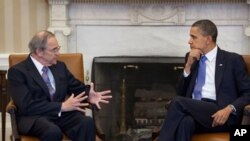President Barack Obama met at the White House on Friday with his new special envoy for Sudan, Princeton Lyman, amid mounting concerns about stability and security in the transition to independence for South Sudan on July 9. The president underscored his "serious concerns" about the situations in the oil-rich region of Abyei, and in Darfur.
A White House statement said President Obama told his new Sudan envoy that he has his full support in leading U.S. efforts in Sudan.
The statement said the president outlined his serious concerns over recent conflicts in Abyei "and the impact that increased bombings are having on civilians in the Darfur region."
Obama underscored his commitment to the establishment of two viable states in northern and South Sudan in July. The two men also discussed the urgency of all parties joining the new opportunities in the Doha Peace Process and of elevating the level of international engagement on Darfur.
A former U.S. ambassador to South Africa and Nigeria, Lyman was appointed by Obama this week as his envoy for Sudan. He replaced U.S. Air Force General Scott Gration in the position.
Both men worked together in the diplomatic effort that led to the referendum this past January in which people in South Sudan voted overwhelmingly for independence.
The referendum was part of the Comprehensive Peace Agreement that Sudan's northern government in Khartoum signed in 2005 with the Sudan People's Liberation Movement aimed at ending two decades of civil war.
Before Friday's Oval Office meeting, Lyman told reporters that "tough" negotiations are ahead before South Sudan's formally achieves its independence in July.
At the State Department on Thursday, he said issues remaining to be settled include border demarcation and the question of oil revenues. Lyman also discussed what he called a "very tense situation" in Abyei, where clashes between rival groups have left more than 100 people dead and displaced at least 20,000.
"We have to work on two fronts. We have to try and ease this immediate security problem, but I don't think we are going to get the tensions really resolved until the people in Abyei know what is going to happen to them, particularly by July. Are they going to remain in the north, are they going to move to the south? And that the Sudanese leadership needs to address," Lyman said.
The United States has deplored violence in Abyei and condemned force deployments there, calling on northern and southern Sudanese leaders to take immediate steps to prevent attacks and restore calm.
U.S. Secretary of State Hillary Clinton addressed the issue Thursday at the State Department. "Deployment of forces by both sides is in violation of the 2005 Comprehensive Peace Agreement, and undermines the goodwill from January's referendum, which was a very important foundation for the peaceful future of Sudan," she said.
In his remarks this week, Lyman also addressed the process leading to a possible decision by Obama to remove Sudan from the U.S list of state sponsors of terrorism.
Lyman said the National Congress Party government in Khartoum fulfilled a major condition for this, by holding the South Sudan referendum and accepting its results. He said he hopes the U.S. examination of remaining issues can be completed by the South Sudan independence date of July 9.
In coming days, Lyman will be in Sudan and Ethiopia working on South Sudan issues. Another U.S. diplomat, Dane Smith, will leave next week for Doha, Qatar, to take part in negotiations about Darfur.
Lyman told reporters this week that the Doha talks had "taken on new life and have new promise," adding that the U.S. intends to undertake an intensive effort on peace efforts for that region of Sudan.
Obama Meets With New Sudan Envoy
- By Dan Robinson





